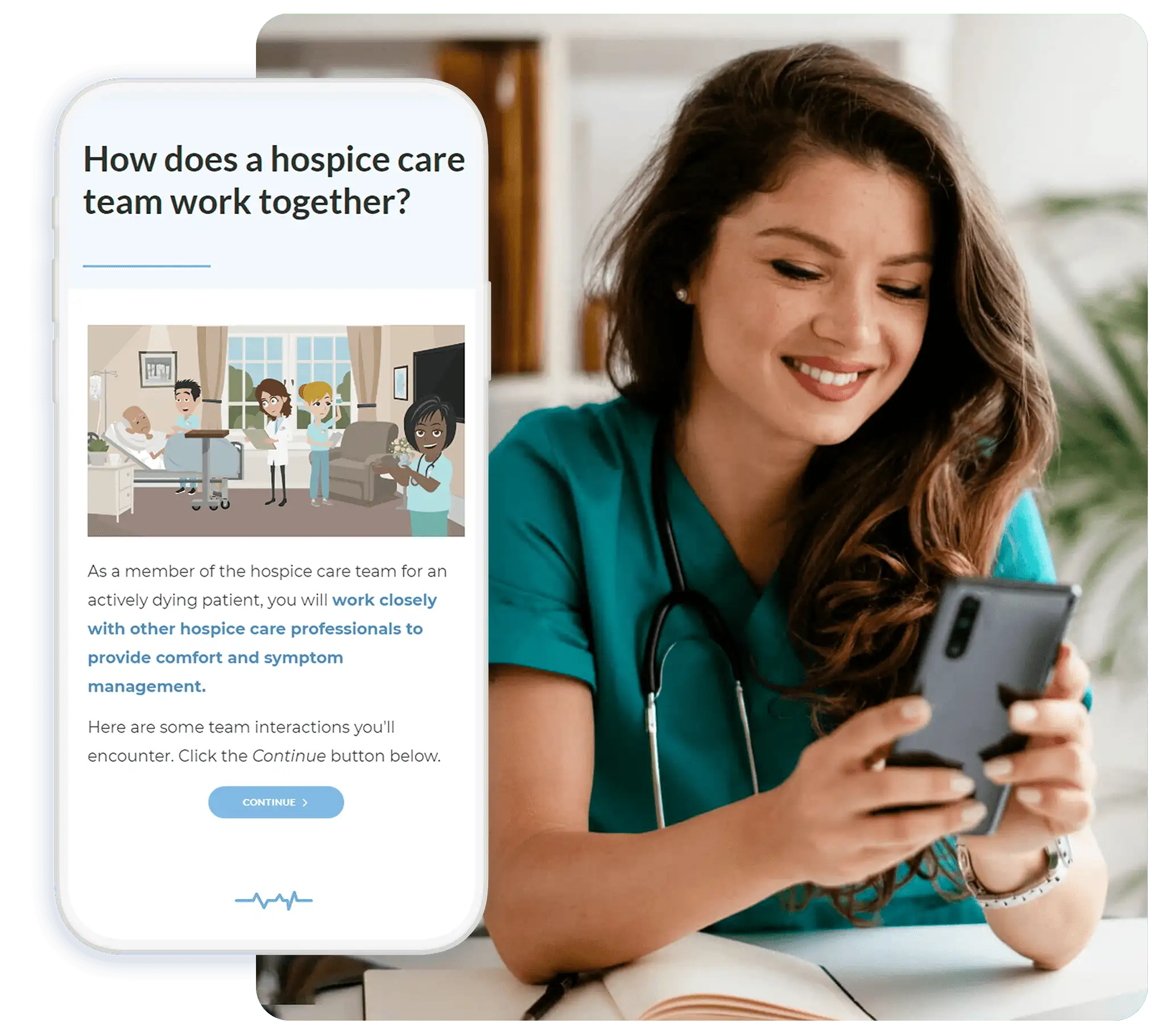Hospice Pain Assessment Training for Care Staff
Proceed into the realm of hospice pain assessment training, divided into two segments, where your specialized knowledge can greatly enhance the living conditions of patients under palliative and hospice care. This educational experience marks your entry into becoming an integral member of a care team proficient at efficiently handling pain related to extreme disease.

Comprehensive Pain Assessment: Mastering Pain Management in Palliative Care – Part One
Are you ready to deepen your expertise in pain assessment within hospice and palliative care settings? This intermediate course is designed for hospice nurses, social workers, counselors, hospice aides, and physicians looking to enhance their knowledge and skills.
What You’ll Learn
- The Bedrock of Treatment Decisions: Recognize that a comprehensive pain assessment is essential for appropriate pain management.
- Patient-Centered Information: Identify patients and their families as the primary source of information, pivotal for a care setting that focuses on comfort.
- Medical History Integration: Integrate the patient’s medical history and current physical examination into the pain assessment process.
Course Features
- Interactive Module: Engage with an interactive module that provides real-life scenarios for assessing patient pain.
- Accreditation: Earn 1.0 contact hours accredited for nurses and hospice aides/CNAs.
- Patient-Centric Approach: Learn to manage pain by focusing on the patient’s wishes and avoiding unnecessary opioid use.
Understanding Pain Assessment Fundamentals
Learn the crucial first steps in managing pain by mastering the foundations of a comprehensive pain assessment, setting the stage for informed treatment decisions.

CONTINUA LEARNING
Simplify Your Hospice Team’s Training and Skill Building
A complete online solution for your agency: more than 125 hospice courses, caregiver in-services, training plans, and more.
Engaging with Patient and Caregiver Perspectives
Gain insights into the importance of considering the patient and their caregivers as central to the pain assessment process, fostering a collaborative care environment.
Integrating Medical History into Pain Care
Discover how to weave a patient’s medical history into pain evaluations, ensuring a holistic approach to their palliative care plan.
Accredited Learning for Professional Development
Achieve accredited contact hours that contribute to your professional growth while enhancing your ability to provide quality, empathetic care to those at the end of life.
Actionable Skills for Immediate Application
Develop immediate, practical skills for assessing and managing pain, enabling you to improve patient quality of life rapidly and effectively.

Comprehensive Pain Assessment: Exploring Multidimensional Pain Factors – Part Two
Continue your journey into Hospice Pain Assessment Training with a comprehensive look at pain’s physical, psychological, emotional, and spiritual factors.
What You’ll Learn
- Holistic Pain Assessment: Complete a standard pain assessment, considering all aspects, like neuropathic and chronic pain.
- Pain Measurement Tools: Utilize various pain-rating tools tailored for patients with severe illness and different levels of pain, from mild to moderate pain to moderate to severe pain.
- Special Populations Considerations: Modify assessments to accommodate cognitive decline cultural and age-related barriers.
- Psychosocial and Spiritual Dimensions: Differentiate between the causes and effects of physical pain on a spiritual level, crucial for end-of-life care.
Course Features
- Advanced Techniques: Learn how to prescribe analgesic medications and apply non-pharmacological methods like acupuncture and reiki.
- Interdisciplinary Approach: Engage with a multidisciplinary approach that includes caregivers and healthcare teams in ongoing pain assessment.
- Evidence-Based Practices: Develop the ability to treat pain with NSAIDs, morphine, and non-opioid alternatives, ensuring effective pain management.
Mastering Physical Pain Assessment Techniques
Dive deeper into physical pain assessments, learning to evaluate pain comprehensively, including identifying underlying causes and effective treatments.
Using Pain-Rating Tools Effectively
Becoming proficient in selecting and applying pain-rating tools is essential for adapting to patients with serious illnesses’ unique needs.
Customizing Assessments to Patient Needs
Learn to tailor your pain assessments to overcome barriers such as cognitive impairments and cultural differences, ensuring every patient receives empathetic and effective care.
Addressing Psychosocial and Spiritual Pain
Explore the interplay between physical pain and psychosocial or spiritual distress and how to address these complexities within your pain management strategies.
Collaborative Pain Management Planning
Enhance your collaborative skills by utilizing an interdisciplinary approach to pain assessment, improving the efficacy of interventions and overall patient care.
Continua Learning Course Features
This online Hospice Pain Assessment Training is built using Continua Learning action and skill-focused training:
- Action-Oriented Learning: Instead of just absorbing information, your staff will practice actions directly contributing to your agency’s success.
- Enhanced Hospice Compliance: With real-world scenarios, the staff is better prepared for audits, ensuring your agency exceeds compliance standards.
- Engaging & Interactive: Gone are the monotonous click-next formats. Our courses are created with interactive elements that engage and reinforce learning.
- Patient Satisfaction: Real-world action-focused training leads to more competent care, directly impacting patient satisfaction and your agency’s reputation.

How to Get Started with Hospice Pain Assessment Training
This course is designed for hospice and palliative care professionals seeking to deepen their understanding of hospice pain assessment, from nurses to aides.
How to Start Training
Hospice Pain Assessment Training is part of a yearly subscription to Continua Learning. Continua Learning delivers over 200 hospice training courses and aide in-services in a mobile solution for easy compliance and tracking it all from one place. Contact us to set up a demo for your agency today!
Elevate your expertise. Enhance patient satisfaction. Start training with the Hospice Pain Assessment Training course today.
Hospice Pain Assessment Training Continuing Education
Each Hospice Pain Assessment Training course offers 1 Contact Hour for Nursing, Certified Nursing Assistants, Home Health, and Hospice Aides. Continua Learning is an approved provider of CEUs from the following boards:
- Florida Board of Nursing
- Florida Board Of Occupational Therapy
- Florida Board Of Speech – Language Pathology And Audiology
- Florida Board Of Nursing – Certified Nursing Assistants
Course Reviewer
Kathleen Webster, BSN, RN, CRRN, brings nearly four decades of nursing experience to her role. Earning her BSN in 1984 and CRRN in 2012, she began her career in acute rehabilitation and later specialized in hospice and home health care for over 25 years.
A seasoned educator, Kathleen has authored numerous eLearning courses and led in-service training programs. As a former community care program director, she trained in-home aides and is committed to inspiring quality care and compassion in hospice and home care.
FAQ
What is the role of opioid management in hospice pain assessment?
Opioids are a critical component in managing moderate to severe pain in hospice care. Our course ensures you are equipped with the knowledge to prescribe and monitor opioids responsibly, minimizing the risk of substance use disorder while maximizing patient comfort.
Can this course help with pain assessment for cancer patients?
Absolutely. Our training delves into the nuances of cancer pain, providing you with the skills to assess and manage pain for patients with advanced diseases, ensuring their comfort and dignity at every stage.
What knowledge will I gain about NSAIDs in palliative care?
You’ll learn to use NSAIDs judiciously for treating pain, understand their role in pain management plans alongside other medications like acetaminophen, and how to manage their side effects, such as constipation.
How does this course address pain management for patients with cognitive decline?
Our course offers strategies to modify pain assessments for patients experiencing cognitive decline or communication impairment, ensuring they receive appropriate pain management that respects their needs and barriers.
How can caregivers and family be involved in the pain assessment process?
Caregivers and family members are essential allies in pain assessment and management. We teach you how to engage them in the process, ensuring the patient’s wishes are honored and the care team is supported.

